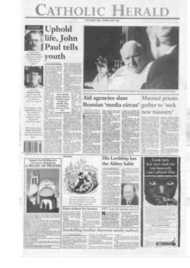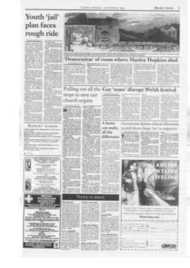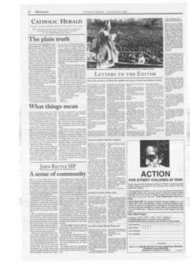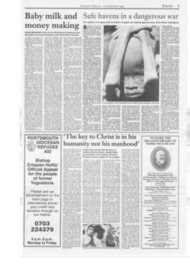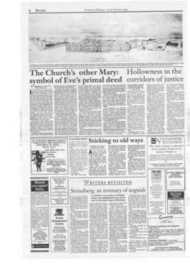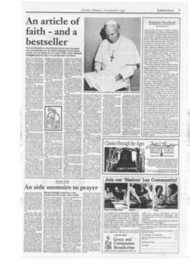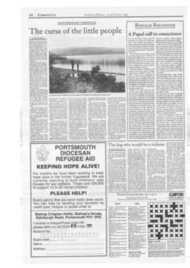Page 7, 20th August 1993
Page 7

Report an error
Noticed an error on this page?If you've noticed an error in this article please click here to report it.
Tags
Share
Related articles
Row Flares Over Rome Stand On Death Penalty
A Catechism For Anglicans Too
Fourteen Months On And Still No English Language Catechism
Don't Tamper With New Catechism, Bishops Told
Question And Answer Version Replaced By 'essentials Of...
An article of faith and a bestseller
The new Catechism of the Catholic Church may have generated controversies over non-sexist language and the death penalty, but it is selling like hot cakes. Italian editor Armando Fumagalli gives his view of its genesis and importance
IN THE COUNTRIES where it has been released, the Catechism of the Catholic Church has been a true bestseller: 700,000 copies have been sold in France and 500,000 in Italy, where for many weeks the publisher (the Vatican Press, which is not organised to distribute texts in such numbers) was unable to respond to the demand.
In Spain, too the Catechism has sold extremely well, although its absence from the newspapers' bestseller lists perhaps shows how unreliable those lists are.
It was to this effective "plebiscite" of the Christian people that Cardinal Ratzinger referred in a lecture to the clergy of Milan last March: the Catechism's reception exceeded his most optimistic expectations. Very positive reactions were also received from the Anglican, Free Church and Orthodox communities (to whose traditions the Catechism devotes a great deal of space), who have said of the new•Catechism that they can accept it almost entirely.
The publication of this catechism is therefore an ecclesial event of primary significance. John Paul II considers it one of the most important acts of his papacy; he summed it up in his meeting at the Vatican in March, with the bishops of Indiana, Illinois, and Wisconsin: "I consider its publication to be among the principal fruits of the Second Vatican Council and one of the most significant events of my pontificate" Elsewhere, the Pope has emphasised the very close connection between this catechism and the Second Vatican Council. Even if one cannot technically call it the "Council's Catechism", in fact it is one of its fruits, destined to be most strongly engraved upon the Christian people. The Apostolic Constitution Fedei Depositum, with which the Pope ordered the publication of the Catechism, has truly dedicated itself to uniting the Catechism with the renewal of ecclesial life so desired since Vatican In the years since the Council, as Cardinal Ratzinger recalled at the Milan conference, requests arose for a new summary of the Faith, but this proposal was judged to be premature. The Church was in too agitated a state to be able to produce an enduring work. The current situation of the Church, however, has finally permitted this instrument to be prepared in greater serenity.
In October 1985, the Extraordinary Synod of Bishops, which convened to reflect on the effects of the Second Vatican Council 20 years after its closing, declared in its final report the need to develop "a catechism or summary of all Catholic doctrine", referring both to faith and to morals, that could be a point of reference for catechisms prepared world-wide.
The Pope adopted this request, declaring in the same discourse during the closing of the Synod that it fully corresponded to a real need in the Church. Thus, in 1986, a commission of 12 cardinals and bishops was formed with the mission of offering guidance and monitoring the results of the seven diocesan bishops who, in preparing the Catechism, created nine successive drafts.
The project of the Catechism was subjected to a very lengthy examination by all Catholic bishops and institutions of theology and catechism. There were 938 replies stemming from this review, containing about 24,000 suggestions.
In the 1990 synod of the bishops, Cardinal Ratzinger revealed that of these 938 replies, 73 per cent considered the proposed revision "good" or "very good", 18 percent "satisfactory with reservations", 6 percent "negative", and 2.7 percent "unacceptable".
The majority of the proposed modifications referred to the parts on morals and prayer. As a result, these two parts were modified extensively in the last draft, while the first two (on the Creed and the Sacraments) remained substantially unchanged.
The long project of compiling the Catechism and the vast consultation which preceded the draft of the definitive text, was the result of a truly collegial labour. The Pope emphasised this aspect in Fedei Depositum: "One has reason to affirm that this Catechism is the fruit of a collaboration of all the episcopacy of the Catholic Church, which generously received my invitation to assume their part of the responsibility in an initiative which is closely tied to the ecclesial life.
"Such a response stirs in me a profound feeling of joy, because the concord of many voices express truly what can be called the 'symphony' of the Faith. The completion of the Catechism thus reflects the collegial nature of the episcopacy, and is a testimony to the Catholicity of the Church."
To understand the historical significance of this catechism, one must realise that the preceding universal catechism of the Catholic Church emerged in 1566, as an expression of the Council of Trent. It was known as the Roman Catechism, and was intended to reinforce the knowledge of the Faith in the face of the Protestant Reformation.
In the 20th century, use of the Catechism of Pius X, which the Pope prescribed for the diocese of Rome in 1905, has been widespread. It was a simple work, composed of questions and answers. Its diffusion was remarkably quick, thanks to its accessibility and clarity, but it made no attempt to be a catechism for the universal Church.
The Second Vatican Council brought a great desire for a revision of the catechism; unfortunately, the results of this desire did not always correspond to its intentions. The intent to render the Christian message more relevant to the people influenced the national editions of catechisms, which at times omitted important aspects of Christian doctrine, or confused the need for universally accessible language with the use of fashionable philosophical categories.
There was a great preoccupation with form, without perhaps an adequate assurance of the contents and the integrity of the proposed message.
The current Catechism was written not to be universally adopted, but is offered as an indispensable model and reference for the national editions adapted for different groups of people, young adults, adults, etc. The synopses at the end of each chapter will be helpful for the reader of this Catechism and for the editors of national compendiums. It is intended to be a major catechism, with the bishops and the editors of lesser catechisms as its primary audience, but it is offered to all Christian people and, as noted, the sales figures show it has been well received.
One of the problems facing this edition of the Catechism was method of exposition. A deductive method was selected and used in a form offering a secure affirmation of the contents of the Faith. Some reference to contemporary issues is made, although overly specific problems are avoided, in keeping with the Catechism's didactic purpose. This work contains the Faith of the Church, not the opinions of theologians.
For this reason it avoids subjectivism in its language and instead uses formulations like: "The Church believes that..." and "We affirm that..." This means of expositions avoids devoting space to the prevailing subjectivism, according to which access to the truth itself is not possible, but rather all things depend essentially on the judging subject.
The Catechism's style is measured, and the editors have succeeded in gaining their objective of a full and ordered exposition of Catholic doctrine. The text has been enriched with brief citations from the Fathers of the Church, the liturgy, and the saints; these offer to the reader beautiful gems of meditation and the mysteries that they present, illuminating the text and revealing the richness of the treasure of Christian spir ituality and the secular tradition of the Church.
There was no desire for originality, but rather for clarity and fidelity, sustained by the conviction that is is the profundity and simplicity of orthodoxy that captivates.
The Catechism is properly of interest to all because it does not merely suggest a private opinion, but rather formulates the response of the communal and secular experience of the Church: "It treats of the human being, but with the conviction that the question of man cannot be separated from what it says about God and the history of God with us. The Catechism must be read as a unity. The pages on morality are misread if they are separated from their context, that is, the profession of faith, the doctrine on the sacraments." Among the most eagerly awaited fruits of this catechism will be a new missionary zeal throughout the Church. The time of disputing and debating everything ad nauseam is over. The Catechism is an instrument of that unity on essential things that, in conjunction with the broader liberty on nonessential things, is one of the preconditions for the new evangelisation that the Pope has spoken of for some time.
It was the lived Faith and the clarity on the essential, and not the perfection of complex pastoral issues, which created in the primitive Church the evangelical enthusiasm that in a few decades brought about the conversion of the pagan world in antiquity.
Today, too, it is with a more profoundly known and fully lived faith that the Church can experience a rejuvenation.
blog comments powered by Disqus


